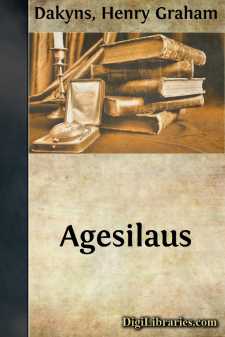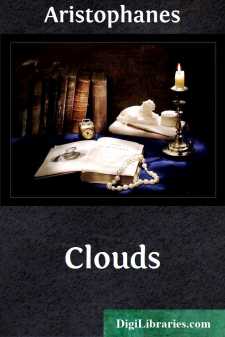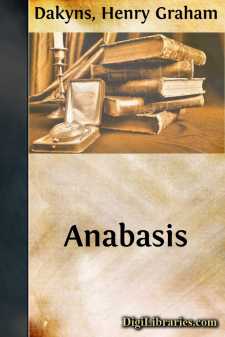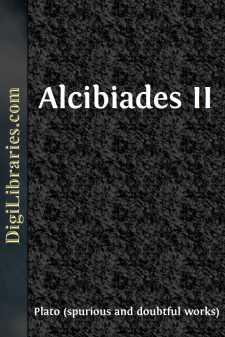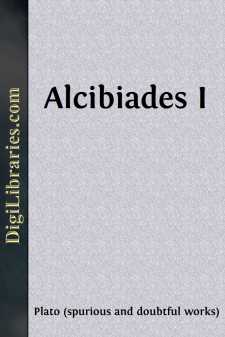Fiction
- Action & Adventure 180
- Biographical 15
- Christian 59
- Classics
- Coming of Age 5
- Contemporary Women 3
- Erotica 8
- Espionage/Intrigue 12
- Fairy Tales, Folklore & Mythology 236
- Family Life 169
- Fantasy 117
- Gay 1
- General 596
- Ghost 32
- Historical 808
- Horror 43
- Humorous 159
- Jewish 25
- Legal 4
- Medical 22
- Mystery & Detective 315
- Political 49
- Psychological 41
- Religious 64
- Romance 158
- Sagas 11
- Science Fiction 730
- Sea Stories 113
- Short Stories (single author) 537
- Sports 10
- Suspense 1
- Technological 8
- Thrillers 2
- Urban Life 31
- Visionary & Metaphysical 1
- War & Military 173
- Westerns 199
Classics Books
Sort by:
by:
Benjamin Jowett
INTRODUCTION. The subject of the Charmides is Temperance or (Greek), a peculiarly Greek notion, which may also be rendered Moderation (Compare Cic. Tusc. '(Greek), quam soleo equidem tum temperantiam, tum moderationem appellare, nonnunquam etiam modestiam.'), Modesty, Discretion, Wisdom, without completely exhausting by all these terms the various associations of the word. It may be described...
more...
by:
Plutarch
Epicurus's great confidant and familiar, Colotes, set forth a book with this title to it, that according to the tenets of the other philosophers it is impossible to live. Now what occurred to me then to say against him, in the defence of those philosophers, hath been already put into writing by me. But since upon breaking up of our lecture several things have happened to be spoken afterwards in...
more...
I To write the praises of Agesilaus in language equalling his virtue and renown is, I know, no easy task; yet must it be essayed; since it were but an ill requital of pre-eminence, that, on the ground of his perfection, a good man should forfeit the tribute even of imperfect praise. As touching, therefore, the excellency of his birth, what weightier, what nobler testimony can be adduced than this one...
more...
by:
Aristophanes
Scene: The interior of a sleeping-apartment:Strepsiades, Phidippides, and two servants are in theirbeds; a small house is seen at a distance. Time:midnight. Strepsiades (sitting up in his bed). Ah me! Ah me! OKing Jupiter, of what a terrible length the nights are!Will it never be day? And yet long since I heard thecock. My domestics are snoring; but they would not havedone so heretofore! May you perish...
more...
I. Darius and Parysatis had two sons: the elder was named Artaxerxes, and the younger Cyrus. Now, as Darius lay sick and felt that the end of life drew near, he wished both his sons to be with him. The elder, as it chanced, was already there, but Cyrus he must needs send for from the province over which he had made him satrap, having appointed him general moreover of all the forces that muster in the...
more...
Commander of Cavalry at AthensIYour first duty is to offer sacrifice, petitioning the gods to grant you such good gifts (2) as shall enable you in thought, word, and deed to discharge your office in the manner most acceptable to Heaven, and with fullest increase to yourself, and friends, and to the state at large of affection, glory, and wide usefulness. The goodwill of Heaven (3) so obtained, you...
more...
APPENDIX II. The two dialogues which are translated in the second appendix are not mentioned by Aristotle, or by any early authority, and have no claim to be ascribed to Plato. They are examples of Platonic dialogues to be assigned probably to the second or third generation after Plato, when his writings were well known at Athens and Alexandria. They exhibit considerable originality, and are remarkable...
more...
APPENDIX I. It seems impossible to separate by any exact line the genuine writings of Plato from the spurious. The only external evidence to them which is of much value is that of Aristotle; for the Alexandrian catalogues of a century later include manifest forgeries. Even the value of the Aristotelian authority is a good deal impaired by the uncertainty concerning the date and authorship of the...
more...
THE APOLOGY OF SOCRATES Among the reminiscences of Socrates, none, as it seems to me, is more deserving of record than the counsel he took with himself (after being cited to appear before the court), not only with regard to his defence, but also as to the ending of his life. Others have written on this theme, and all without exception have touched upon the lofty style of the philosopher, which may be...
more...
by:
Benjamin Jowett
INTRODUCTION. In what relation the Apology of Plato stands to the real defence of Socrates, there are no means of determining. It certainly agrees in tone and character with the description of Xenophon, who says in the Memorabilia that Socrates might have been acquitted 'if in any moderate degree he would have conciliated the favour of the dicasts;' and who informs us in another passage, on...
more...




